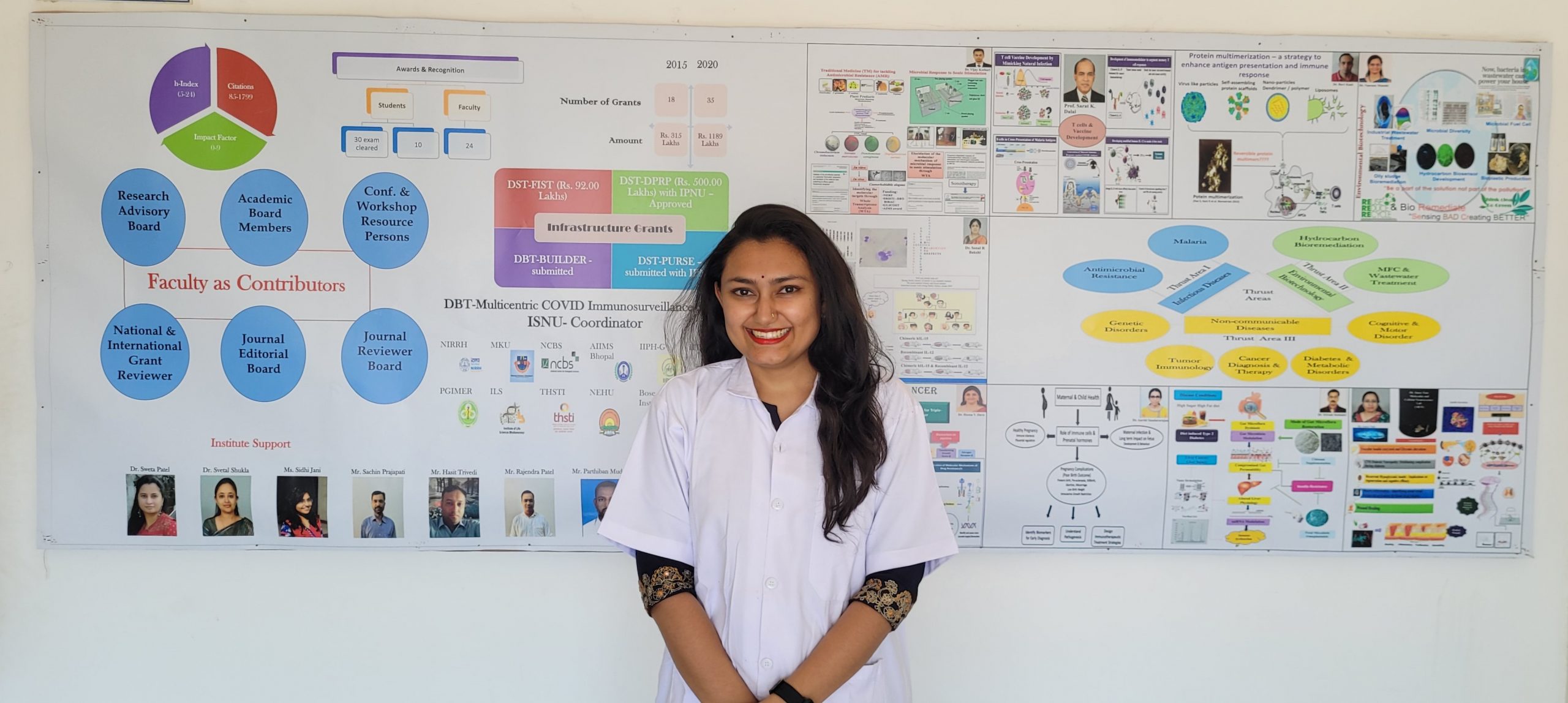
Awards and Achievements
Achievements at National Level
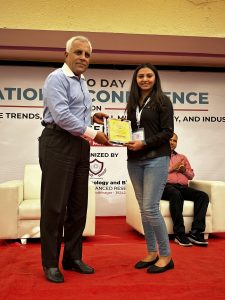 prize for oral presentation in the ‘Emerging Scientist’ category at the “National Conference on Antimicrobial Resistance Trends, Environmental Microbiology, and Industrial Solutions (ARTEMIS)” at the Institute of Advanced Research, Gandhinagar during March 21-22, 2024.
prize for oral presentation in the ‘Emerging Scientist’ category at the “National Conference on Antimicrobial Resistance Trends, Environmental Microbiology, and Industrial Solutions (ARTEMIS)” at the Institute of Advanced Research, Gandhinagar during March 21-22, 2024.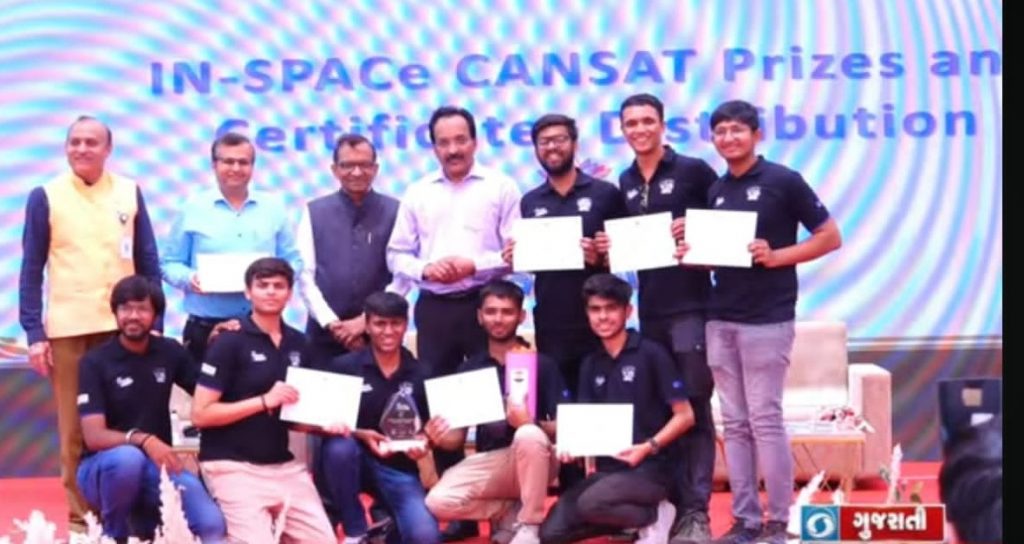
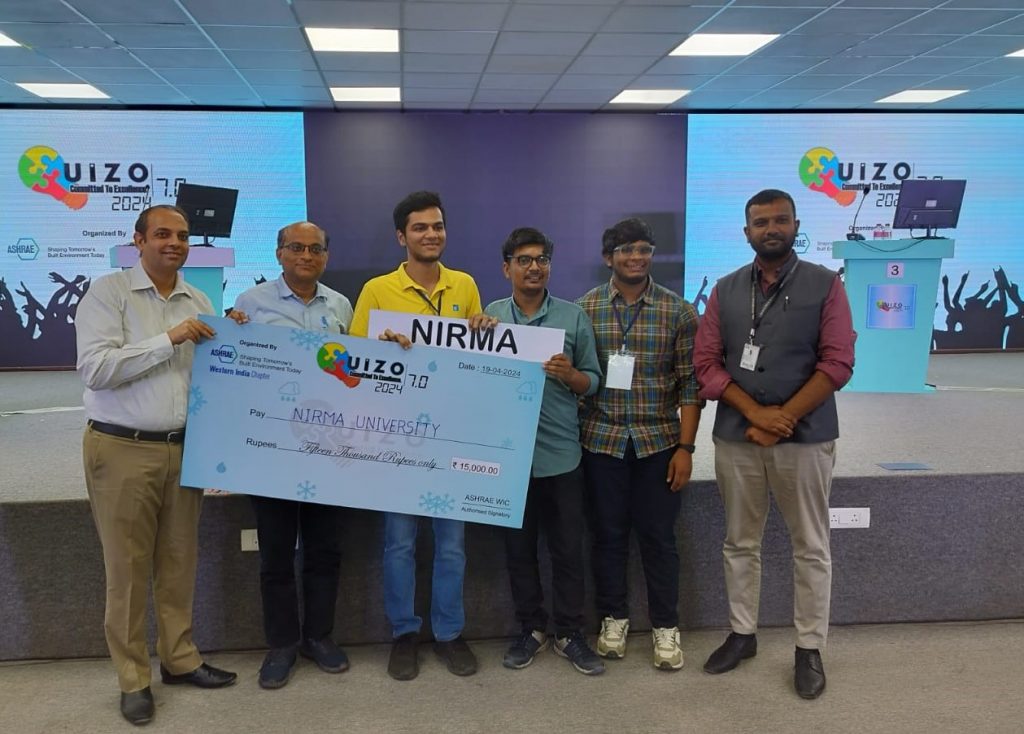
Other Achievements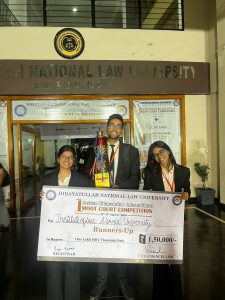
The team comprising Aditi Bharadwaj, Kopal Ved and Shaswat Ranjan from the Institute of Law has been adjudged as the Runner-up of the 1st Justice Hidayatullah International Moot Court Competition, 2024 hosted by HNLU Raipur on March 15-17, 2024.
Intra-University Level Achievements
Short Film Competition
Institute of Design organised a Short Film Competition with the theme ‘Stories from the margins’ in Feb-March 2024. The student team of the Institute of Design comprising Arunoday Singh Thakur, Soumyanshu Ghosh and Suhani Gupta stood first; while Vidhi Singhal and Akshita Jain from the Institute of Commerce stood second.
Students’ Speak
Ms Shivalika Maheshwari
MSc Biochemistry
Institute of Science, Nirma University
Can Science explain Consciousness?
What is consciousness?
There is a spiritual connotation to the word ‘consciousness’. This is a subtle concept or phenomenon with no physical evidence to it. The processes which run in our body are enabled by the centralised consciousness in each atom of our cell, and same is said to be residing in a particle of soil too! Consciousness can be best understood by this statement I found by Sri Aurobindo – “Consciousness is a fundamental thing in existence. It is the energy, the motion, the moment of consciousness that creates the universe and all that is in it. Not only the macrocosm but also the microcosm is nothing but consciousness arranging itself. For instance, when consciousness in its movement or rather a certain stress of movement forgets itself in the action it becomes an apparently unconscious energy, when it forgets itself in the form it becomes the electron, the atom, the material object. In reality it is still consciousness that works in the energy and determines the form and the evolution of form. When it wants to liberate itself, slowly, evolutionarily, out of matter, but still in the form, it emerges as life, as animal, as man and it can go on evolving itself still further out of its involution (meaning ‘entanglement’ which is opposite of evolution) and become something more than mere man!”
One need not be overwhelmed by various explanations of consciousness, since it is a phenomenon to be ‘realised’ rather than ‘proved’.
Consciousness still remains an unsolved puzzle by the scientific community.
When we talk of science, we are talking about a curiosity that needs to be solved through a series of steps or methodology that culminates in the result that needs to be analysed and interpreted. The result of a scientific quest is what is the experimental proof on which the world can rely on, and not raise objections, as no argument can beat what has been scientifically proven. For instance, why the blood clots and the wound heal as if it wasn’t there ever; is addressed through experiments and explained by meticulous flow chart. Similar to wound healing many other biological curiosities have been answered through experiments and are often referred by the scientific community as easy problems. The term ‘easy’ for a problem to be solved is a relative one, indicating that compared to these, there are ‘hard’ problems, else the term ‘easy’ for certain curiosities was not required!
Let’s see what are the ‘hard problems’ in science?
The term ‘hard problem’ is coined for those biological curiosities which are probably not yet amenable to current experimental techniques. One such interesting and complex problem that has baffled the neuroscientists through ages is the ‘Hard Problem of Consciousness’.
While trying to find out about consciousness by literature search and Internet surfing, I came across a talk “Can scientific enquiry lead us to self-knowledge?” where question of consciousness is addressed in the realm of science – Scientific endeavour requires an object to study various phenomena with its sense of object. Let’s understand this by an example. If someone says ‘Oh! That food is tasty!’ and the other person responds “but I can’t see it” clearly shows that the sense of object which is taste by the tongue is not compatible with seeing by the eyes. Therefore, the scientific methodologies probably cannot address these conflicting statements. It has been widely accepted that “there is no object that can reveal or prove consciousness, because consciousness itself is the object.”
‘Vedanta’ or ‘Upanishads’ talk about consciousness which is scientifically proven by the ancient Rishis. In Vedanta we say ‘neti, neti’ that which is not this body nor the mind, and so on. And by isolating the pure state of being alive i.e., being conscious, science is expected to find the proof of that awareness.
Today’s science is itself doing the same thing through step-by-step railing that consciousness is separate from matter, the physical object. Thus, the machines which carry out the same functions as human brain for example, a calculator which can remember, evaluate, create, and solve analytical problems, even better than a human being, is still not considered conscious because it lacks that basic quality which makes a living thing ‘Living’. Thus, science is experimentally determining that consciousness is a much subtler phenomena present in the matter, but at the same time is not the matter alone. The Hard Problem of Consciousness is when science meets spirituality. However, spiritual leaders with scientific background believe, science does not, cannot, should not, and need not attempt to prove consciousness using conventional scientific methodology.
Hence, it is not that science cannot prove consciousness. However, the fact that such a subtler force of energy which is consciousness needs to be studied through a subtler dimension. Till science describes what consciousness IS, in the process it at least proves what it IS NOT! This is in line with the ‘neti – neti’ in terms of Vedant and Upanishads.